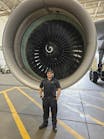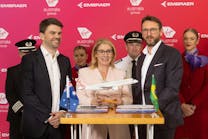Imagine a day when a giant airplane takes off, powered by plant oils, spent cooking oil or just plain old garbage instead of traditional jet fuel.
It may still be a ways off before this new technology is cost-effective, but scientists and aviation experts are focused on finding alternatives that reduce the carbon footprint of air travel.
Air Canada and Airbus announced Monday that they have commissioned a study by BioFuelNet Canada, a non-profit research organization.
Based at McGill University, BioFuelNet will come up with possible sustainable fuels.
Air Canada won't divulge the cost of the agreement, citing confidentiality, but the goal is to examine different raw materials and processes with the goal of supplying Air Canada with alternate fuel.
A preliminary report outlining the best options is expected by year's end. Possible sources include municipal solid waste or waste from forestry and agriculture, other plant oils and even algae.
But Donald Smith, president of BioFuelNet and a McGill University professor, said the key is to use non-food materials, noting that the demand for ethanol has had a serious impact on corn prices.
While municipal solid waste looks promising, because cities will pay to have the material hauled away, Smith cautions that the dynamics may change if garbage suddenly has a value.
Etienne Cabare, a project manager for Airbus, acknowledges that price remains a factor, but believes that once production technologies improve, prices would come down in the next two years.
"By how much, I don't know," he said, adding similar studies and projects are underway in other countries, including China.
"Air Canada has demonstrated through two biofuel flights of its own that biofuels are technically feasible and effective at reducing emissions," said spokesman Peter Fitzpatrick. "Efforts are underway to get aviation biofuels on line to assist industry to achieve its target of carbon neutral growth for 2020 and beyond," he added.
Last June, an Airbus 319 jet with about 120 passengers was loaded down with recycled cooking oil on a flight from Toronto to Mexico City as part of an International Civil Aviation Organization demonstration to showcase greener alternatives.
Estimates suggest carbon dioxide emissions were cut by more than 40 per cent compared to a traditional flight.
In March, KLM began testing the use of biofuel containing used cooking oil on a weekly Boeing 777 flight from New York to Amsterdam.
Copyright 2013 Toronto Star Newspapers Limited



